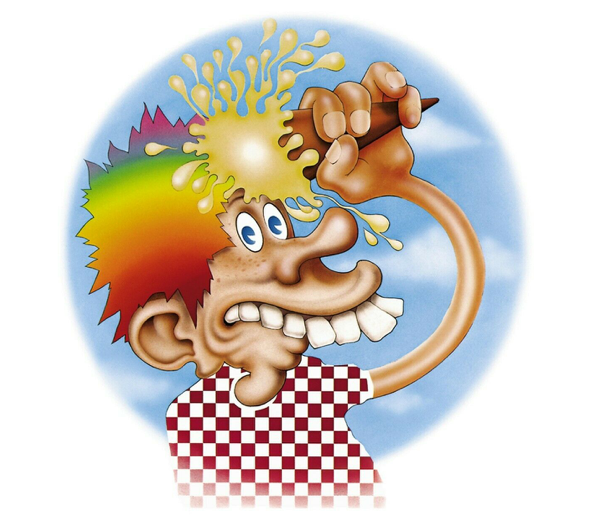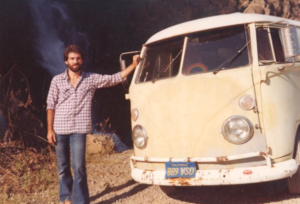
Concert of the week in Grateful Dead history: May 26, 1972 (Listen Now)
What’s to be found racing around?
You carry your pain wherever you go.
By The Deadhead Cyclist
For Week
22
Many have pondered the phenomenon by which a rock ’n’ roll band became a multi-generational movement spanning six decades. Even now, more than 25 years after the death of the “leader of the band,” Jerry Garcia, the enigmatic Grateful Dead experience is alive and well in the form of thousands of recordings, countless cover bands – most notably Dead & Company – and iconic images such as the “Truckin’ Fool,” from the Europe ’72 album.
One answer may lie in the ever present theme of life on the road, found ubiquitously throughout the Dead’s sacred texts. Songs like Going Down the Road, On the Road Again, Promised Land, Beat It On Down the Line, The Other One, and of course Truckin’, all evoke the imperative to “get up, get off, get out of the door.” Whether it’s a weekend camping trip or a year-long journey around the world, the human experience is an adventure, and the Grateful Dead’s focus on this aspect of life was not only a fundamental part of the band’s persona, it spoke to a universal principle: the need to explore.
In the Spring of ’72, the Grateful Dead explored the European continent with 22 shows, resulting in the highly acclaimed “Europe ’72” album that many Deadheads – myself included – grew up listening to. This week’s pick for T.W.I.G.D.H., the final show of the Europe ’72 tour, May 26 at the Lyceum Theater in London, is well-represented on this album, including the entire third record, which features Truckin’, Morning Dew, and plenty of improvisational jamming in between.
One tune from this show that didn’t make it onto the album, Black Throated Wind, represents our shared and compelling need for adventure in a way that runs the gamut of emotions; from sadness and regret to optimism and hope, with profound doses of guilt and inspiration in between.
What comes through clearly in lyricist John Perry Barlow’s poignant poetry, is that there is much “to be found racing around,” but perhaps not what one might imagine when embarking on the adventures of the road. The expectation that the suffering of everyday life might be shed with a mere change of scenery is a myth, for the pain is very personal, representing an integral part of your identity “wherever you go.” Or, as the well-known saying goes: “Wherever you go, there you are.” Most of us learn this invaluable life lesson the hard way by trying to run away from our troubles, rather than facing up to them. As Bob Marley wisely notes in the song, Running Away:
Ya running and ya running and ya running away
Ya running and ya running, but ya can’t run away from yourself
Hitting the road – whether by plane, boat, train or, in the present case, by thumb – will necessarily cause us to shed certain layers of protection, bringing us face to face with our essential self. One by one, the illusions we’ve accepted as reality dissolve, revealing what needs to be confronted and reconciled. Such is the nature of a stripped down life where all that is left is “the highway, the moon, the clouds and the stars.”
It is vital to a successful life to take breaks from the mindless patterns we find ourselves mired within and find a new place, a purer place, to rediscover who we are and create a re-vision of who we can and want to be.
One of the most transformative experiences of my life was a road trip I took in the fall of my 30th year. My heart was broken by the end of a relationship, and I had just finished a very intense period of work. I was carrying a lot of pain, and was horribly fatigued after working 24/7 for months on the launch of a business. I packed up my guitar, camping gear, a box of cassette tapes – including plenty of Grateful Dead, of course – and hit the road in my trusty VW van.

The adventures that followed were life-changing, mostly with respect to what I learned about myself and the role I had played in the demise of my relationship. In the absence of my apartment, friends, job, routines and familiar surroundings, I could not escape the truth – much like the subject of Black Throated Wind – that the object of my affection had done better by me than I’d done by her. In short, the stubborn position that I had hung my hat on – that she was the one to blame for the failure of our relationship – softened over the course of the miles on the road, and morphed into a truer version of events, and myself, which has served me well.
It’s interesting to note that “vacation” is derived from the word “vacate,” which is defined as follows: to leave a place that one previously occupied. To fully understand this, though, we must identify “place” as more than a physical location, and expand the definition to include the emotional space we find ourselves in due to habitual behavior. (Note: Tellingly, that place is often referred to as a “rut.”) It’s vitally important to take breaks from the mindless patterns we find ourselves mired within so as to find a new place, a purer place, to rediscover who we are and re-envision who we can and want to be.
Often it’s not possible to take a proper vacation when this need arises, which is why I have developed the art of “microvacation.” Like microdosing, a microvacation offers just enough of the benefits of a full vacation, without requiring the traditional week-long absence from work, family and other responsibilities. For me, taking a mini-road trip on two wheels for as little as one hour refreshes my mind and almost invariably lands me in a better place upon my return. I try to take such a microvacation daily, and recommend the practice whole-heartedly.
Whether it’s a month-long road trip, a week on the beach, a day-long hike to the summit of a “14er,” a 60-minute bike ride, or a walk around the block, putting your arms around the pain that you carry “wherever you go” will inevitably lead to that moment when you’ll say, “here comes the light.”
Concert of the week in Grateful Dead history: May 26, 1972 (Listen Now)
Subscribe and stay in touch.